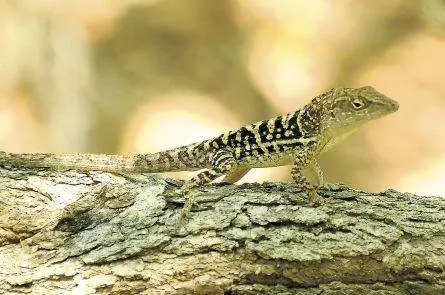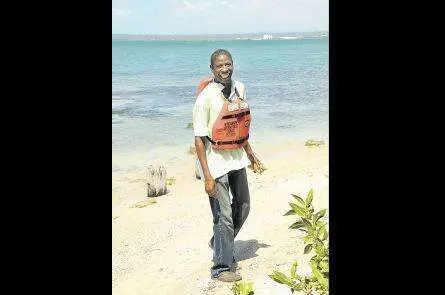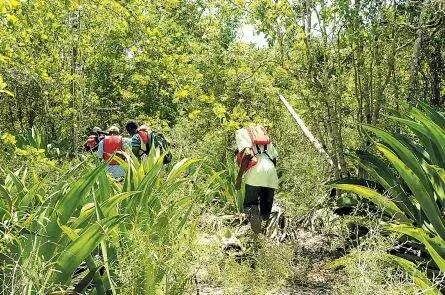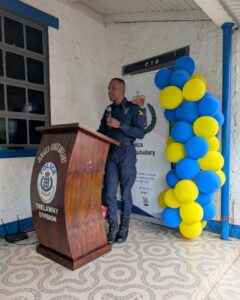
Lost on Great Goat Island
SOMETHING was bound to happen when Karl Angell, executive editor for operations at the Jamaica Observer, informed his colleagues last Thursday that the boat ride to Goat Islands from Old Harbour Bay would last an hour and 10 minutes.
Angell himself is not one known to journey out to sea, for fear of what could befall him, considering he has never been in water deeper than three metres, plus other natural elements that would mitigate his very existence.
So, off we trekked from Kingston by road to the docking station at Old Harbour Bay, hoping to get a clearer, first-hand picture of what the fuss between environmentalists and the Government was all about.
Our 9:00 am departure from the edge of the power plant was delayed, but the precise approach by three members of the Marine Police based at Old Harbour Bay, who facilitated the Sunday Observer team with the utmost professionalism, erased any ounce of anxiety that had crept in.
In the end, Angell’s projected journey time fell short by 50 minutes — the Observer team of Michael Gordon, Karyl Walker, Shawn Barnes and myself had beached, in around 15 minutes, at what Marine Police called Little Goat Island. Maybe Angell had a journey to Colombia in mind.
The typical tourist would love Little Goat Island. There was no champagne waiting, but a glorious white sand beach greeted us upon arrival.
Fierce, blood-thirsty mosquitoes had us consistently moving. They were the biggest mosquitoes that one could ever see, but their presence reminded some of us that physical exercise was indeed essential.
Two recently used spots charred by ash indicated that the locals, or perhaps even those who wanted to take a break from law enforcers, had whipped up their favourite meals.
Young crabs, probably numbering in the thousands, hustled into holes and other hiding places upon the arrival of the enemy. Apart from the persistent mosquitoes, the island, said to be around 300 acres, although it seemed much smaller from sea, was the ideal getaway spot — literally. Starfish, oysters and other marine life were on the coastline in abundance.
So happy was he that he had walked onto paradise at sea, Karyl Walker turned deejay in a warm-up session for a stand-up report for Barnes’ Observer online feature.
But it was time to set off to Great Goat Island which, from all accounts, was where all the action would be. After all, we had heard stories of wild goats aplenty, iguanas, snakes, birds and other creatures in fairly decent numbers.
The additional 15 minutes around the coastline by the Marine Police team, whose members asked not to be named, allowed some of us to enjoy the scenic surroundings that hitherto, we had been deprived of.
And finally, Great Goat Island … at our step-off point there was no white sand, but mosquitoes from the smaller island had seemingly communicated with their colleagues that fresh blood was heading their way. The reception they gave us was spectacular, to say the least.
More oysters by the mangrove had Gordon thinking that he could gain some strength from the mollusc that some men use to boost their egos and other things.
There were cacti plants galore, birds were chirping as if to find out what goodies the foreigners had brought, butterflies fluttered unmolested and a few lizards joined in on the action on a section of the land that is said to be double the size of Little Goat Island.
“Be careful of sinkholes,” one member of the police team urged us and we took off into the unknown. “Maybe it’s best if you walk with a piece of stick and touch the ground in front of you as you go,” he continued.
The aloe vera plants had Walker in absolute excitement. Plants not readily seen on the mainland were there in abundance.
There was no specific route outlined, and while the team walked on rocky surface, no markers were left behind to project a return path to the boat.
Gordon had no problem snapping away at one lizard, which gladly posed for its guests as if it were in a photo studio. But he struggled to keep pace with the birds — ground doves — which clearly did not need the publicity.
“Mikey, see one over ya so,” was one of the regular soundings, in hushed tones, by the policemen who led the way. But lack of fitness proved to be a hurdle to the top Jamaica lens man, and by the time he eventually got close, the birds had sensed that their privacy was being invaded. Eventually, Gordon got his prey, but it took much sweat, scratches and perhaps a trip to the shoemaker later on.
But the route through thick vegetation, dormant ant nests, bees and the persistent mosquitoes was getting tricky.
Soon, the inevitable happened. Reality had struck. We were lost.
It was time for action. Common sense had to prevail.
Walker volunteered to lead the mission. But wait! We had policemen in our midst who were trained in that area. So Walker’s bold ambition to be in charge was indefinitely put on hold.
“Navigator, wha you say now? It look like it fruitful?” Gordon asked the lead policeman, a corporal.
“We soon find out; mek we go this way,” he responded.
“Dat a my landmark,” Walker jumped in, pointing to a few familiar green plants.
“Anywhere you see a whole heap a aloe, a it dat,” he gloated.
“You remember this spot ya?” Gordon asked Walker, who seemed as bewildered as some of the creatures on land.
Walker again blurted out: “No sah, no sah, no sah,” as another mosquito strike squad hit him with a few of their missiles.
“Let’s just keep on moving. These mosquitoes are dangerous,” the lead policeman uttered.
“We passed this aloe plant on the right when we a go up,” Walker again murmured.
“No man, it wasn’t so much aloes here so,” Gordon responded, almost losing his balance as a mosquito sang a 1950s pop song in his ear.
The team came to another crossroads. “Wha you say, we go left or right?” the leader shouted to the team.
“Left me say,” shouted Walker. “Left me say too,” added Gordon and Barnes.
Things were getting sticky. Walker appeared so flustered that he pointed his microphone towards a tree, apparently hoping to get an interview from the seemingly rare plant.
But caramba! A cheerful shout from one of the policemen. Sea was in sight … the boat too.
“Bway, this call fi a round,” Walker uttered. It was the climax of the Great Goat Island experience. Soon, the trip back to the mainland would be under way, mindful of choppy seas at that time of afternoon.
Exactly 22 minutes later, the team had returned to civilisation, but not before Walker slept through the rough ride, snoring like a woodcutter in a thick forest.
At least Angell got something right when he suggested that the team take drinking water on the trip.
Proponents and opponents of the highly-touted Goat Islands development will continue their verbal and perhaps legal battles in coming months. But for the Jamaica Observer team, the trip to the St Catherine-governed islands was well worth it. The constabulary’s men who guided the team did so with skill and professionalism, for which their superiors would be proud.
Walker summed it up nicely when he said, “Let’s drink to that.”




























